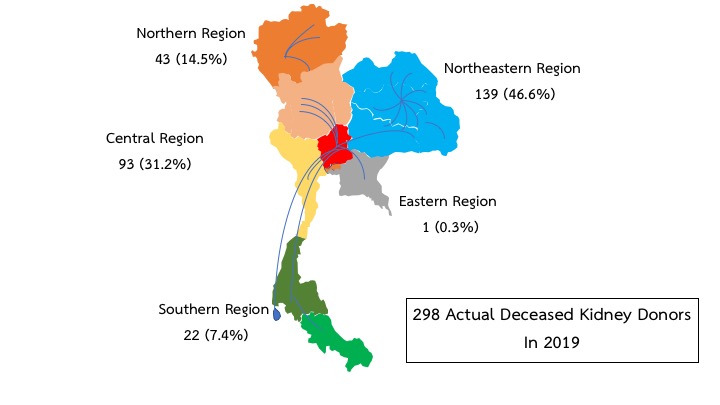Readiness of the retrieval team for deceased donor kidney transplantation in Thailand
Korntip Phonphok1, Yuwadee Attajarusit2, Supanit Nivatvongs2,3, Visist Dhitavat2, Phitchayaphat Wannasirikul4, Somyote Srijaranai4.
1Medicine-Nephrology, Rajavithi Hospital, Bangkok, Thailand; 2Organ Donation Centre, Thai Red Cross Society, Bangkok, Thailand; 3Department of Surgery, Faculty of Medicine, Chulalongkorn University, Bangkok, Thailand; 4Permanent Secretary Office, Ministry of Public Health, Bangkok, Thailand
Background: Deceased donor kidney transplantation has a tendency to increase in Thailand since the implementation of Service Plan in Donation and Transplantation in 2016. Kidney retrieval team serves an essential part, where the retrieval scheme is assigned and allocated for the central and regional teams by Organ Donation Centre, Thai Red Cross Society, based on computerized scoring system and geographical areas. In 2019, the number of deceased kidney donors increased, while some cases lost to be retrieved due to retrieval team unavailability. Never had a clear study about the gaps before. Here, we focused to explore the situation and cause of this problem.
Methods: We retrospectively reviewed the retrieval of actual brain death kidney donors data in 2019, from Organ Donation Centre, Thai Red Cross Database. The data was analyzed by using frequency and percentage. We also collected the qualitative data by in-dept interview the key informants and by lesson learned.
Results: There were 298 kidney deceased donors in 2019, with 139 cases (46.7%) were donated from Northeastern region donors. Only 54.4% of the first candidate on retrieval team lists had undertaken the surgical kidney retrieval. Available rates of the central and regional team were 28.7 % (43 out of 150 cases) and 79.7% (118 out of 148 cases), respectively. The majority of the first-order teams were Northeastern region team (76.3%) that were available to perform their retrieval within regional designated areas (figure). Qualitative data revealed that the common refusal reasons were unacceptance of controversial high-risk kidney donors, inconvenience to travel via road transportation, unavailability due to their actual job responsibilities, and inappropriate incentives.

Conclusions: Majority of the available kidney retrieval teams were the regional teams, compared to the central teams. As for the controversial high-risk kidney donors, using donor’s clinical and histological features predicting donor quality would be helpful in the decision process. In order to improve the kidney retrieval schemes for the central teams, providing faster and more convenient transport, particularly, in the areas not currently reached by air, and providing appropriate incentives should be considered and supported. Meanwhile, promoting and strengthening the regional retrieval teams aside from Northeastern to serve the kidney recovery within the health region areas is prioritized and empowered.
There are no comments yet...